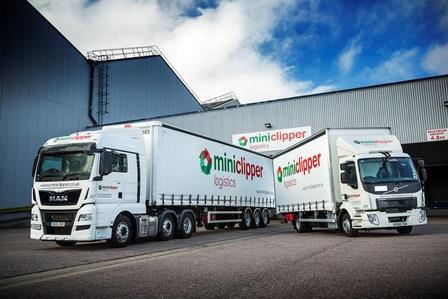
Palletline member Miniclipper Logistics has admitted volumes have not been hit as badly as expected by the COVID-19 pandemic but that companies without a warehousing side might struggle to survive.
“We can handle it,” MD Peter Masters told motortransport.co.uk. “It’s going to take a bit of a nose dive but we were expecting slightly worse than it is.
“In the pallet sector we were expecting it to be 40% down but now we’re talking 29%. It’s looking a bit better than we budgeted. Our profit will take a dip between now and the end of the financial year but it’s not a car crash.
“We’re lucky we have the warehousing side of the business which is very buoyant. But hauliers that were running hand to mouth before this crisis kicked off are going to be in a tricky situation now. They’ve only got the transport sector to rely on. If it’s been badly hit they’ll struggle. We’re lucky in a way but sometimes you make your own luck.”
Masters also claimed the pandemic would make it impossible for companies to budget for next year: “The problem we’ve got, and the problem a lot of companies like us will have is they’ll be putting a budget together for next year and they won’t have a clue,” he said. “It’s a finger in the air job.
“When they turn the tap back on is there going to be significant volume coming through because there’s loads of back orders? You might have three weeks really busy and then it peters out again. Is it going to be a slow process?
“And is the economy going to be the main thing that drives it? If the economy is shot, that’s really going to have an effect on business going forward and that’s when you might find there’s some casualties because there’s too much supply and not enough demand. So there’s challenges ahead."
Read more
- Miniclipper Logistics: “We’re an IT company that happens to deliver stuff!”
- “New normal” may see hauliers take on all customers’ warehousing
- Demand for warehousing and distribution space up 10% in Q1
A priority at the moment, Masters said, was chasing overdue payments: “We’ve still got some clients closed which brings other challenges – how are you going to get paid? But we’re pretty hot on making sure we get it all."
The Bedfordshire-based company's revenue is split roughly at 40% warehousing and 60% haulage. Clients come from a wide range of sectors including retail, clothing, foods, raw materials, packaged chemicals and industrial products.
Masters has furloughed around 36 staff but revealed he was set to bring them all back amid signs that volumes are starting to pick up. “The roads are busier and people are looking at ways of working to end the lockdown,” he said.
“Palletline inbound numbers have held up really well, mainly because we’ve got six trailers going into Amazon. And we’ve got one side that does a lot of medical stuff. We’ve got NHS Supply Chain and they are crazy busy.
“We’ve got other customers that we thought would fall off a cliff, and initially they did, but now we’re doing a lot of internet shopping stuff for them. We’ve seen a big increase in percentage volume of home delivery. It’s something that we avoid if we can but it’s coming through the network now.”
Asked if there was a feeling that general haulage was on its knees, Masters said: “Everyone’s different. Some might have big customers that are struggling. We haven’t seen that. I haven’t heard that but I can only talk about Miniclipper and Palletline.”
Masters also predicted changes to working patterns in the wake of the pandemic: “I’ve been working from home for five weeks now on Teams, Zoom and webinars. Teams is fantastic, even for a Palletline board meeting where we’d normally have to get in our cars and sit round a table. Now we do it on Teams and it’s working well.
“What you’ll find in the new world is there’ll be some changes in habits and you might find there’s less congestion on the roads because people aren’t driving to offices. There might be a hit on commercial office rental or leasing. It might be that people don’t need office space so much because they can operate from home. There are some changes ahead."













![Logistics North East 1[73400]](https://d2cohhpa0jt4tw.cloudfront.net/Pictures/100x67/6/5/9/17659_logisticsnortheast173400_443720.jpg)
